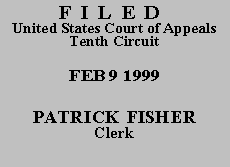

| NITA J. SEGRAVES,
Plaintiff-Appellant, v. KENNETH S. APFEL, Commissioner, ASocial Security Administration, Defendant-Appellee. |
|
The application for benefits filed in February 1994, alleges an inability to work after April 5, 1991, due to back and hip pain and low mental functioning. On consideration of the application, an administrative law judge (ALJ) determined that plaintiff could perform her former work and thus was not disabled. The Appeals Council denied review, making the ALJ's decision the final decision of the Commissioner. The district court affirmed.
Plaintiff argues to us that the Commissioner's decision is legally infirm and is not supported by substantial evidence. She insists that she cannot perform her past relevant work because she has never been capable of performing substantial gainful employment; that the ALJ erred in finding plaintiff physically and mentally capable of performing her past work; and that the Medical-Vocational Guidelines require a finding that plaintiff is disabled.
We review the Commissioner's decision to determine whether it is supported by substantial evidence and whether correct legal standards were applied. See Hawkins v. Chater, 113 F.3d 1162, 1164 (10th Cir. 1997). "Substantial evidence is 'such relevant evidence as a reasonable mind might accept as adequate to support a conclusion.'" Soliz v. Chater, 82 F.3d 373, 375 (10th Cir. 1996) (quoting Richardson v. Perales, 402 U.S. 389, 401 (1971) (further quotation omitted)). We may neither reweigh the evidence nor substitute our judgment for that of the Commissioner. See Casias v. Secretary of Health & Human Servs., 933 F.2d 799, 800 (10th Cir. 1991).
We have carefully reviewed the record on appeal, as well as the briefs submitted by the parties. Applying the standards set out above, we affirm the denial of supplemental security income benefits for substantially the reasons stated in the magistrate judge's November 7, 1997 report and recommendation, as adopted by the district court's February 5, 1998 order.
The judgment of the United States District Court is AFFIRMED.
ENTERED FOR THE COURT
Circuit Judge
*. This order and judgment is not binding precedent, except under the doctrines of law of the case, res judicata, and collateral estoppel. The court generally disfavors the citation of orders and judgments; nevertheless, an order and judgment may be cited under the terms and conditions of 10th Cir. R. 36.3.
1. After examining the briefs and appellate record, this panel has determined unanimously to grant the parties' request for a decision on the briefs without oral argument. See Fed. R. App. P. 34(f); 10th Cir. R. 34.1(G). The case is therefore ordered submitted without oral argument.